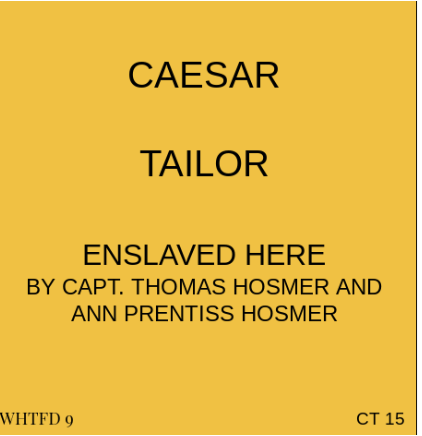
Noah and Thatcher Talk about Caesar
A transcript from a student podcast
Noah: Hello and Welcome to U.S. Hard History. This is a podcast where I and a special guest discuss parts of U.S. History that are shameful and are often difficult to talk about. I am your host Noah Burgio and with me today is a Connecticut historian, Thatcher Slocum, here to share his expertise in West Hartford Slavery.
Thatcher: I’m excited to be here today.
Noah: Let’s start today’s podcast by discussing why schools often don’t focus on slavery in the History curriculum. What are your thoughts on that?
Thatcher: Slavery is one those topics that is very shameful and embarrassing to talk about and it can be very emotional. And for this reason, it is often skipped over or lightly covered in the classroom because it may evoke negative emotion or be difficult to teach.
Noah: Can you describe the slave conditions and how enslaved people were dehumanized?
Thatcher: Enslaved people were only used for profits and treated like property, not like humans. Their names were taken away when they came to the new world and were given new names. They worked for unreasonably long hours in poor conditions to get the most profit out of the labor.
Noah: What were some of the ways that the enslaved retained their humanity?
Thatcher: -Despite being dehumanized in many ways, the enslaved were allowed to attend religious services, even though they were most likely segregated by race in these services. adding a human quality to their lives and maybe giving them hope of freedom in the future. They had the potential of learning skills and having some free time.
Noah: How did the government play a role in dismantling or maintaining slavery?
Thatcher: One way that the government maintained slavery was by passing laws, such as the slave codes, which greatly limited enslaved peoples’ freedoms and made it much more difficult to escape. For example, the enslaved were prohibited from learning how to read, which would make a successful escape much more difficult. The Fugitive Slave Acts also maintained slavery, as they required that all citizens of the United States, whether living in free state or slave state, to help catch African Americans suspected of having escaped slavery.
Noah: Now in addition to slavery in general, lets focus specifically on slavery in Connecticut.
Thatcher: A lot of people think that slavery was limited to the southern states, but that really wasn’t the case. In fact, by 1774, Connecticut had about 5,100 enslaved people according to historical documents, and every single town or district in Connecticut had at least one enslaved person.
Noah: So going more locally, what slavery was like in West Hartford (which was then called the West Division of Hartford)?
Thatcher: In the West Division there were actually a total of 62 enslaved people, belonging to 25 slaveholding families. One major slaveholder was Capt. Thomas Hosmer, and, being a family man, businessman, military leader, church member, and a slaveholder, he was noted to have been “the model colonial citizen” and very well respected at the time. He enslaved Caesar, Hannibal, Hercules, Simone, Yorke, Lew, Kate, and Caesar 2, of whom we had the most research and knowledge on Caesar.
Noah: Can you tell us a little bit more about Caesar?
Thatcher: While researching Caesar, we had to divide what we found out about him into what we definitely know based off of documents and what we can infer from those documents.
There are a few things that we know for sure: Caesar was enslaved by Captain Thomas Hosmer. Caesar was definitely not his birth name. After Capt. Thomas Hosmer died, Caesar was inherited by Hosmer’s wife, Ann. He was a debtor to John Whitman who was a trader and merchant who he bought cloth from. We can infer that he had the ability to sew. We can infer that this skill could have earned him money and given him some satisfaction.
We think he died by 1753 because his Ann Hosmer did not pass him along in her will when she died in that year.
There were many challenges with researching Caesar and other enslaved people. Since they were treated as property, their lives were not viewed as particularly important and they were not heavily documented. For this reason, there are many things that we don’t know and still wonder about Caesar:
How old was he?
Where was he born?
Did he escape or was he freed by Capt, Thomas Hosmer?
How did he die?
Did he enjoy anything in life?
Where was he from?
Did he or other enslaved people believe in religion?
We still have a lot of things to wonder about.
